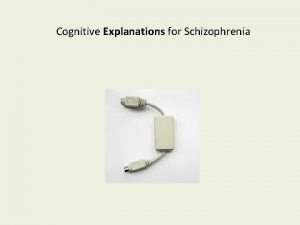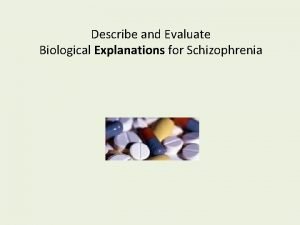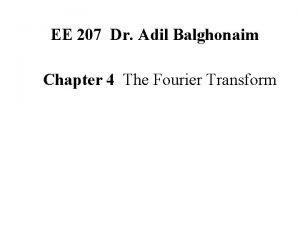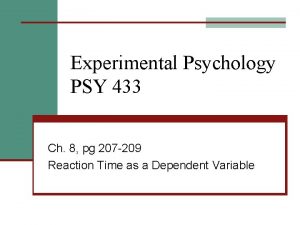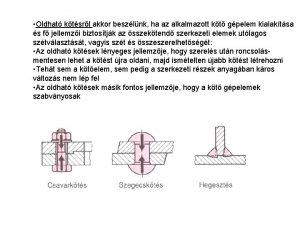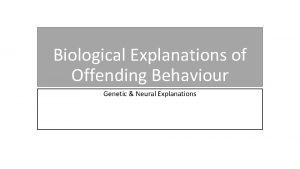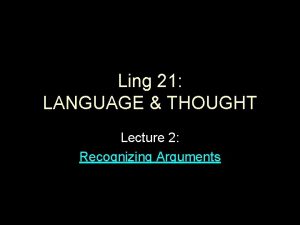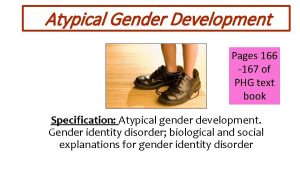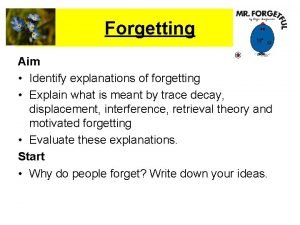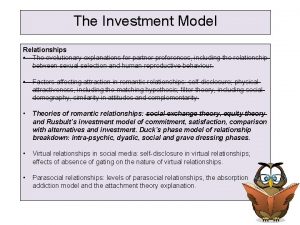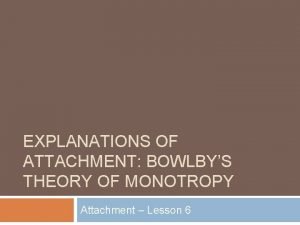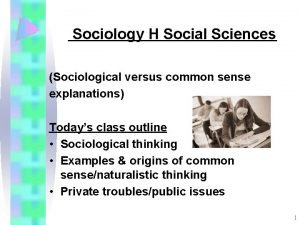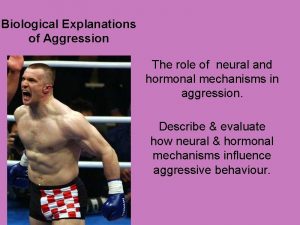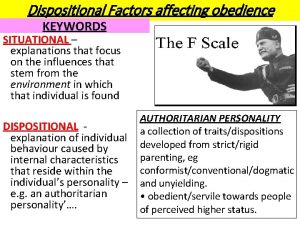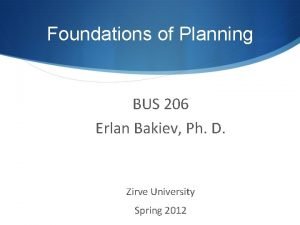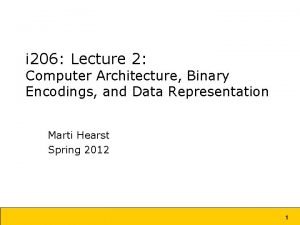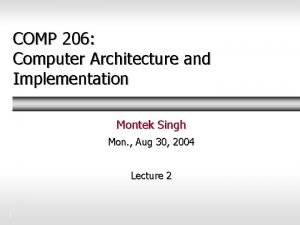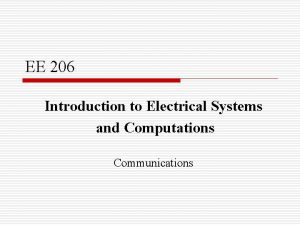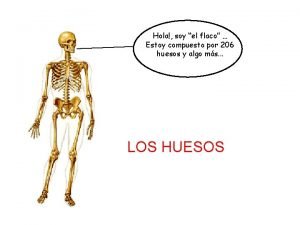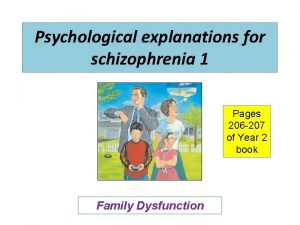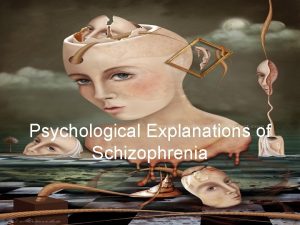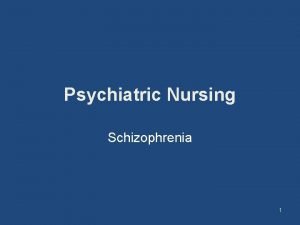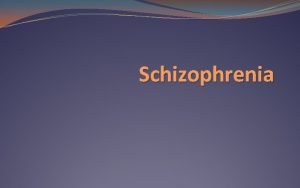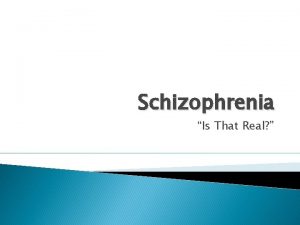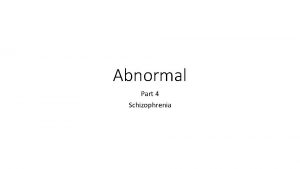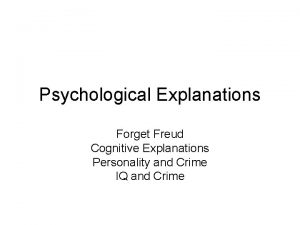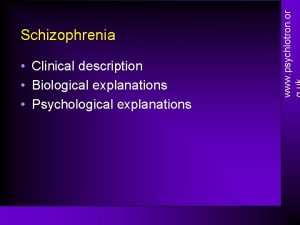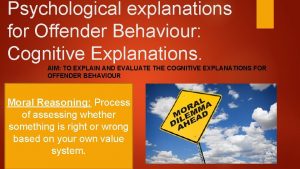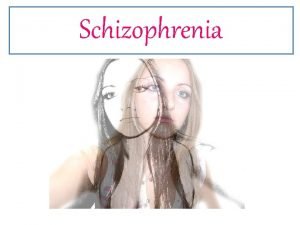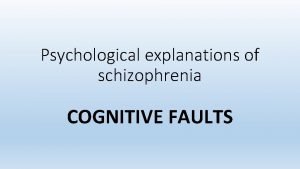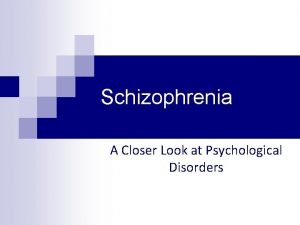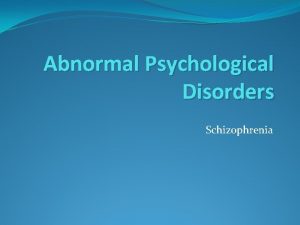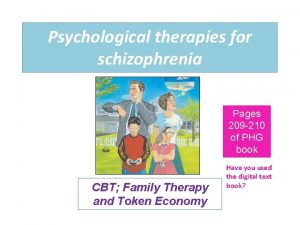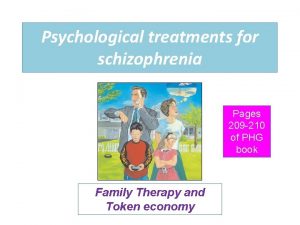Psychological explanations for schizophrenia Pages 206 207 of












































- Slides: 44

Psychological explanations for schizophrenia Pages 206 -207 of PHG Have you read the spread in the PHG? Have you made a note of the key terms? Have you read the Course Companion? Have you read the Sz pack I emailed you ?

Psychological explanations for Sz Spec states: Psychological explanations for schizophrenia: 1. Family dysfunction 2. Cognitive explanations, including dysfunctional thought processing

Learning Outcomes • Describe the family dysfunctional explanation to Sz • Evaluate this explanation using both research and issues and debates

Family Relationships • Biological processes are clearly important in both the origins and symptoms of schizophrenia • Psychological processes are also important • The impact of family relationships has been put forward as a possible explanation for schizophrenia. • Psychologists have attempted to link schizophrenia to the childhood and adulthood experiences of living in a “dysfunctional family”

Family dysfunction Is characterised by poor family communication, cold parenting and high levels of expressed emotion. These may be risk factors for both the development and maintenance of Sz

The 3 key characteristics research has suggested is evident in Sz in relation to their family 1. Criticism 2. Conflict 3. Breakdown in communication

“Schizophrenogenic mother” Early theorists influenced by Freudian ideas, thought that a ‘schizophrenogenic mother’, who was cold, dominant and created conflict, caused schizophrenia to emerge in the child (1948) These mothers were said to be rejecting, overprotective, self-sacrificing, moralistic about sex and fearful of intimacy She creates secrecy and distrust The distrust, resentfulness and instability caused by such a parent was thought to induce a schizophrenic reaction, like paranoid delusions.

By the 1980 s research had concluded that there was no such thing as a ‘schizophrenogenic mother’ It had become apparent that only a small percentage of women who might arguably fit the criteria of schizophrenogenic mother had actually produced schizophrenic children. Conversely, many schizophrenics were found to have mothers who did not fit the criteria The theory has been criticised for hindering progress in psychiatry and understanding of this complex disorder https: //crazymer 1. wordpress. com/2011/03/13/schizophrenogenic-mothers-andmental-illness/

‘Double Bind Theory’ Bateson (1972) - a British anthropologist and social scientist, was one of the first researchers to look at the family dynamic of Sz patients. He said if children receive mixed messages from parents e. g. being asked for a hug and then being pushed away, then they learn that they cannot trust the messages they receive from others. They fear doing the wrong thing but are unsure of what the wrong thing is. They learn that the world is confusing and dangerous leading to disorganised thinking and resulting in lack of trust their own feelings and perceptions

‘Double Bind theory’ Bateson (1972) ‘double bind’ describes when – the children are ‘punished’ for doing what was asked (giving a hug, then being pushed away) – then punished again when the parent gives no reason for pushing them away and withdrawing their love. • theory suggests children will become confused and lose their grip on reality. • Negative symptoms of social withdrawal and flat affect may be an appropriate and logical response to such situations. • Bateson said this obviously wasn’t the only type of communication the child receives but it is a risk factor for Sz.

Expressed Emotion (EE) is the level of negative emotion expressed towards the Sz sufferer by their carers It is a type of negative family communication style that involves: • Critical comments through both tone and content, occasionally accompanied by violence • Hostility towards the patient, including anger and rejection • Emotional over-involvement in the life of the patient, including needless self-sacrifice If these factors are high, this is a serious source of stress for the person and is the primary cause of relapse in Sz sufferers.

Using your text books and other resources, complete exercise 8. 7 and 8. 8 in your PHG packs • Use your course companion and/or Sz pack to help you.

Support for family dysfunction as a risk factor • There is evidence to suggest that difficult family relationships in childhood are associated with increased risk of schizophrenia in adulthood • For example, Read (2005) reviewed 46 studies of child abuse and schizophrenia in adulthood and concluded that 69% of adult in-patients with a diagnosis of schizophrenia had a history of child abuse - for men the figure was 59% • Adults with insecure attachments to their primary carer are also more likely to develop schizophrenia

Weak evidence for family based explanations • Information about childhood experiences is gathered after the symptoms have developed, therefore the schizophrenia may have distorted the patients’ recall of these childhood experiences – this creates a serious problem of validity • Dysfunctional family explanations for schizophrenia have historically led to parent-blaming. Parents, who have already suffered at seeing their child’s descent into schizophrenia underwent further trauma by receiving blame for the condition • In the 1980 s there was a shift from hospital to community care (often involving parental care), and this possibly added to a decline of the schizophrenogenic mother and double-bind theories PSYB 3

Summary of explanation • Psychological explanations look to the person’s environment to explain schizophrenia • Families can influence both the onset (through socialisation) and the maintenance (through high EE) of schizophrenia • The diathesis-stress model of schizophrenia is where biological factors cause a predisposition to develop schizophrenia however the stress factors in the environment may well be to do with family dysfunction and negative EE

Psychological explanations for Sz Spec states: Psychological explanations for schizophrenia: 1. Family dysfunction 2. Cognitive explanations, including dysfunctional thought processing.

Cognitive Explanations for Schizophrenia • Outline the cognitive explanations for Schizophrenia • Explore the cognitive reasons for Psychotic symptoms • Explore research which demonstrates a cognitive explanation

RECAP COGNITIVE APPROACH • What are the main cognitive assumptions in explaining abnormal behaviour? • How do cognitive psychologists study the mind? • Can you name at least 4 functions of the mind ? • Can you identify where these functions are located within the brain?

COGNITIVE VIEW • Agrees with biological view that during hallucinations the brains of people with schizophrenia are producing strange and unreal sensations (triggered biologically) • The disorder develops further when an individual attempts to understand or make sense of the sensory experiences they are having

So…lets recap the cog approach What does the Cognitive approach assume? 1. assumes that the key to understanding people is understanding how the mind works 2. primarily concerned with investigating internal mental processes like thinking, problem solving and memory. 3. It explains behaviour in terms of how the mind processes information 4. The underlying idea is that the mind works like a computer – information is inputted, stored and retrieved. 5. As information processors our minds actively organise and manipulate the information we receive – we do not merely passively respond to our environment So in terms of schizophrenia we are interested in the processes and the way information is organised / processed

Cognitive explanation • We know that Schizophrenia is characterised by disturbance in language, attention, thought and perception. • This has led to cognitive psychologists to explain the disorder as a result of dysfunctional thought processing. • Lower then usual levels of information processing (possibly caused by biological factors) suggest that cognition is likely to be impaired

A patient describes what it is like to suffer from schizophrenia • I can’t concentrate on TV because I can’t watch the screen and listen to what is being said at the same time. I can’t seem to take in two things like this at the same time especially when one of them means watching and the other means listening. On the other hand I seem to be always taking in too much at the one time, and then I can’t handle it and can’t make sense of it. (quoted in Mc. Ghie & Chapman 1961 pg 106)

What’s going on inside their ‘black box’? People are laughing on the bus There’s something wrong with me

What’s going on inside their ‘black box’? My papers are not where I left them People are trying to sabotage my career

What’s going on inside their ‘black box’? I can’t hear what people are saying My family is plotting against me

There are 3 cognitive explanations we need to know

1. Dysfunctional Thought Processing In Sz thinking may be impaired because some areas of the brain are not processing information effectively. For example, reduced processing in the ventral striatum is associated with the negative symptoms of Sz

Positive symptoms: Thinking irrationally would lead to…. The individual not thinking clearly and Such as…. Delusions … specifically potentially of persecution (everyone is out to get me) ‘exaggerating’ If the information is not correct (dysfunctional) this could also lead to deficits in their ability to process the real world…. This could lead to symptoms such as …. Hallucinations

Negative symptoms: There is the idea that a Sz experiences a heighten sense of mental stimulation and it is the strategy that they use that is the symptom. . . Can you think of an example? Social withdrawal could be the strategy of dealing with an overwhelming mental stimulation. . Can deal with the mental stimulation in public No emotion could be the strategy used to control the amount of emotion they do actually experience

Frith et al (1992) has conducted lots of research into the cog explanation The 2 other key concepts that you need to refer to are: 2. Meta-representation: ability to reflect on our own thoughts. 3. Central control: ability to supress automatic responses and thoughts.

2. Meta- representation This is the cognitive ability to reflect on your own thoughts and behaviour. This dysfunction means you may not recognise your thoughts as your own. This could lead to hallucinations or mind control delusions

Christopher Frith (1992) • Frith suggested that schizophrenics fail to monitor their Frith own thoughts correctly, misattributing them to the outside world. • When a person hears voices, it is actually their own inner speech being misinterpreted however sufferers may believe that someone or something in the external world is communicating with them. • Such processing problems in people with schizophrenia are sometimes referred to as alien control symptoms because the sufferer feels as if external forces are influencing their thoughts and actions and they have no personal control.

PSYCHOLOGICAL EXPLANATION: COGNITIVE APPROACH Frith (1992) attempted to explain the onset and maintenance of some of the positive symptoms of schizophrenia. This is called the faulty filter model. His idea is that people with schizophrenia are unable to distinguish between actions that are brought about by external forces and those that are generated internally. The filter between conscious and preconscious processing breaks down.

3. DYSFUNCTION OF CENTRAL CONTROL • Central control is the ability to supress automatic responses whilst performing deliberate actions. • People with Sz become confused and this results in them making little sense when they speak because each word they speak triggers automatic associations in their mind which they cannot suppress. • Dysfunction of Central Control leads to poverty of speech

Evidence for this is the Stroop Effect • People with Schizophrenia find the Stroop task difficult because it requires cognitive skills. • Check it out and have a go! https: //faculty. washington. edu/chudler/words. html#seffect • Stirling et al (2006) compared people with Sz with a control group on the stroop test - the Sz group found it much harder and took much longer. They couldn’t easily supress the desire to say the word rather than the colour the word was written in.

Let’s remind ourselves of the Symptoms (Behavioural Outputs) • POSITIVE SYMPTOMS – TYPE 1 – Distortion of normal function Delusions, hallucinations, disorganised speech, under the control of an alien force, disordered thinking • NEGATIVE SYMPTOMS – TYPE 2 – Lack of normal function Apathy, no emotion, flat effect, social withdrawal, Speech poverty, Avolition)

Beck & Rector (2005) – cognitive model Neurobiological Environmental Cognitive Behavioural Abnormal brain functioning Vulnerability to stress… …the environment (e. g. family) Dysfunctional beliefs… Dysfunctional behaviours

Conclusion – AO 3 • • • Genetic factors or adverse conditions in the womb can lead to a biological vulnerability and this can take the form of biochemical or neuroanatomical abnormalities ↓ The biological vulnerability can lead to psychological vulnerability such as an inability to process information appropriately ↓ Cognitive processing deficits can lead to cognitive distortions, misattributions and hyper-arousal ↓ These cognitive difficulties can become exacerbated by stressful life events and therefore could go on to produce some of the psychotic symptoms of schizophrenia such as delusions and hallucinations ↓ The role of social factors in triggering dysfunctional thinking needs to be explored

Evaluation of Cognitive Approach Focuses on the current cognitions Plenty of research into the idea Influential and popular model Includes biological and the psychological factors Empowers the individual to change Blaming the individual can make the disorder worse Is thinking really irrational? Which is the cause? Which is the effect?

Task Using your text books and notes, complete exercise 8. 9 and in your PHG pack – 10 mins

Possible Essay Question Outline and evaluate cognitive explanations for schizophrenia. Refer to at least one other explanation in your evaluation. (16 marks)

Possible Essay Question Paul has the belief that he is being constantly watched by people who are out to get him. He often hears voices. For example, one is the slow, deep voice of an elderly man who angrily states, ‘You’re worthless. You’re going to be found out!’ With reference to Paul, discuss cognitive explanations for schizophrenia (16 marks)

Possible Essay Question Compare biological and cognitive explanations for schizophrenia. Refer to evidence in your response (16 marks)

Homework Ensure you have written up your revision notes to include the following: • A definition of cognitive explanations • An explanation of what is meant by dysfunctional thought processing • Examples of dysfunctional thought processing • Evaluation of cognitive explanations of schizophrenia
 Cognitive explanations of schizophrenia
Cognitive explanations of schizophrenia Diathesis stress model
Diathesis stress model Printed pages vs web pages
Printed pages vs web pages Outline one psychological explanation of schizophrenia
Outline one psychological explanation of schizophrenia Csc 207
Csc 207 Adil balghonaim
Adil balghonaim Pg 207
Pg 207 Ae 207
Ae 207 Oecd 207
Oecd 207 Csavarbiztosítások fajtái
Csavarbiztosítások fajtái Oae 207
Oae 207 Iso/tc 207
Iso/tc 207 Acc 207
Acc 207 Write an integer for each situation worksheet
Write an integer for each situation worksheet Apche 207
Apche 207 Art 207 tfeu
Art 207 tfeu As a result of 207 years of pax romana, the roman empire
As a result of 207 years of pax romana, the roman empire Neural explanations of offending behaviour
Neural explanations of offending behaviour Premise indicators
Premise indicators Dust bowl migration map
Dust bowl migration map Gender dysphoria biological explanations
Gender dysphoria biological explanations Explanations for forgetting
Explanations for forgetting Russian
Russian The investment model of relationships
The investment model of relationships Monotropy definition
Monotropy definition Outline and compare two explanations for offending 16 marks
Outline and compare two explanations for offending 16 marks Examples of common sense and sociological explanations
Examples of common sense and sociological explanations Biological explanations of aggression
Biological explanations of aggression Dispositional factors affecting obedience
Dispositional factors affecting obedience Comp 206
Comp 206 En 206-1
En 206-1 Round 787 206 to the nearest ten
Round 787 206 to the nearest ten Plan bus 206
Plan bus 206 206 to binary
206 to binary The verb estar (p. 107) answers
The verb estar (p. 107) answers Qin dynasty (221-206 b.c.e.)
Qin dynasty (221-206 b.c.e.) Comp 206
Comp 206 Make the common case fast
Make the common case fast 206 ptt
206 ptt 206 tl
206 tl Ee 206
Ee 206 Hola flaco
Hola flaco Arizona fair wages and healthy families act
Arizona fair wages and healthy families act Psir 206
Psir 206 En 206-1
En 206-1
